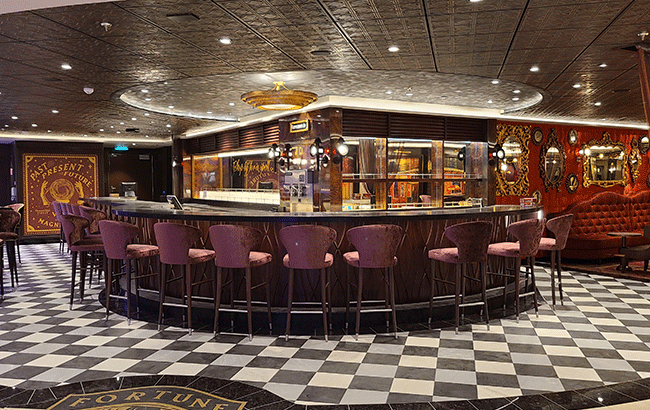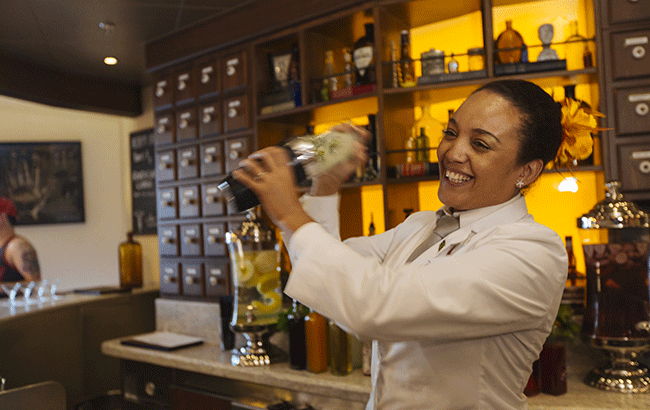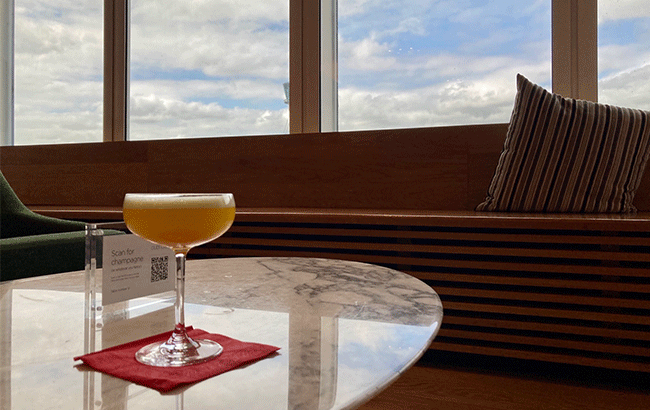How have bars in the travel sector adapted to Covid-19?
Bars on cruise ships and in airports have been hard hit by the fallout from Covid-19. Now, as passengers start to travel again, we examine how operators are responding to their return, and what the future may hold.

*This feature was originally published in the October 2021 issue of The Spirits Business magazine.
There’s scarcely a corner of the international on‐trade that hasn’t been affected by the fallout from the Covid‐19 pandemic, but perhaps some of the most universally and dramatically hit were venues linked directly to the travel industry. Those located in airports and cruise ships, for example, have undoubtedly faced some of their most challenging times over the past 18 months. And while things are hardly back to normal, there have been moves in that direction.
When travel restrictions began to hit in early 2020, the practical considerations for these on‐trade outlets were numerous and varied. There were issues relating to stock and supply, staff to take into account – not to mention significantly reduced numbers of customers, or none at all. By mid‐March that year, all major cruise lines had paused operations, with most only resuming 16 months later in July 2021. In March 2021, a year after the World Health Organization declared the Covid‐19 outbreak a pandemic, Airports Council International reported that the crisis had removed more than 6.1 billion passengers in 2020, down from a projected 9.5 billion for the year.
“Needless to say, the industry‐wide shutdown had a dramatic impact on our business, including of course our beverage operations,” says Edward Allen, vice-president of beverage operations for Carnival Cruise Line. When its ships stopped sailing, Carnival was faced with repatriating 30,000 crew members, a number of whom worked in themed bars and lounges throughout its fleet, as well as its on‐board breweries.
The company is now bringing its beverage team back gradually, taking what Allen describes as “a measured approach to resuming service across our fleet”.

Norwegian Cruise Line, meanwhile, has returned with five of its 17 ships, all with a full complement of staff, despite being at 50% passenger capacity. For Luis C Ortega, director of beverage development and operations, the benefit is being able to offer “more specialised and personal service with our increased staff‐to‐guest ratio”.
Airport bars and restaurants aren’t necessarily enjoying the same ratios. According to Aaron Burkes, general manager of the highly regarded One Flew South in Hartsfield‐Jackson Atlanta International Airport, they’re experiencing the same lack of staff faced by many non‐airport venues at the moment, but perhaps more keenly.
“Every restaurant is competing for the top talent and we have the additional hurdle of putting them through extra security measures that come along with working in an international airport. Some of our staff members have gone on to start their own businesses, and some decided that it was the optimal time to switch careers altogether,” he says. “But we are fortunate that several of our most tenured staff members were eager to help us develop new normals.”
Staff recruitment
Staff loyalty has been an important factor for the return of Virgin Atlantic Clubhouses too.
“One thing we’ve heard from other people in our industry is that finding teams to work in airport lounges or service environments is difficult right now. Some didn’t have the confidence they’d be able to hire the same quality of team behind the bar, and have standardised their offering,” says Rami El‐Dahshan, head of Clubhouses for Virgin Atlantic.
“We’ve done the opposite because we’ve managed to keep our mixology team. We’re lucky to have a loyal group of staff – a team that have been happy to come back to us, especially the ones that were furloughed.”

Staffing hasn’t been the only hurdle presented by the pandemic. “The supply chain has also been a challenge,” says Burkes. “We have found ourselves substituting far more products than we ever did in the past, including but not limited to food, beverages, and even paper products.”
El‐Dahshan agrees this has been a challenge. “The biggest word is ‘uncertainty’ – not being sure how long things would be closed for, and what would open up first,” he says. “This has an impact on your supply chain. What do you stop ordering, and how quickly can they come back? What’s perishable and what isn’t?”
As this uncertainty diminishes, to some extent, and as passengers return to airports and cruise ships after an enforced hiatus and to often markedly different circumstances, it’s unsurprising that their approach to bars in these spaces has changed too.
For Carnival, the difference has been positive. “The response to our onboard product offerings, including the beverage programme, has been nothing short of phenomenal, as there was a definite pent‐up demand in cruising,” says Allen. “Obviously there are some changes to our on‐board protocols and procedures but our guests are truly enjoying being back on board.”
The same is true for passengers returning to Norwegian, says Ortega. “Guests are using the bars the same way or even more than ever before,” he says. “They are requesting different cocktails and spirits, trying new drink concepts, while demanding a personalised service.”
El‐Dahshan adds: “We’re seeing longer dwell times. People want to spend longer in our clubhouses.” But he says there’s been a shift in what they’re ordering: “We’re seeing customers really enjoying the classics – there’s a desire to have something familiar.”
Necessary innovation
One unexpected change he’s noticed is the result of necessary innovation when it comes to menus. “We actively encourage customers to speak to us rather than order from the QR codes, but some prefer to order from them,” he says. “I thought they’d be here until everything relaxed, then we’d get rid of them, but I think they’re here to stay.”
Norwegian has taken the opportunity to make some voluntary changes to its bar programme. It has introduced Sail & Sustain Cocktails, a sustainability‐focused concept making use of surplus ingredients, such as cucumber peels from its freshly squeezed juice bar, or overly ripe fruit to make cordials, garnishes and more.
It has also taken inspiration from the success that spirit‐delivery apps enjoyed during the pandemic, replacing its minibars with a new on‐demand delivery service, via guests’ cabin TVs.
In the face of some unprecedented challenges, these recent times have shown that the on‐trade – wherever it is – remains resilient and adaptable.
Related news
